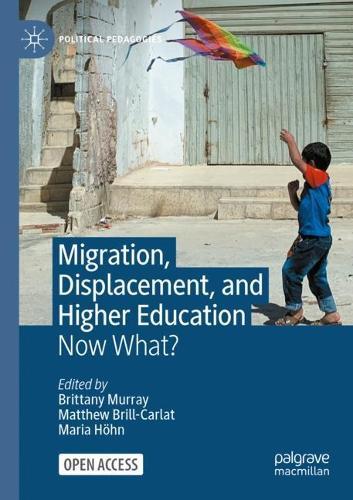Overview
This open access book is a nuanced introduction to Forced Migration Studies and a toolkit for faculty and undergraduate students, with a special emphasis on community-engaged learning. Experts from the social sciences, humanities, arts, and experimental sciences offer interdisciplinary perspectives to translate critical analysis into concrete action. The collection highlights activists, artists, and educators who have initiated projects in cooperation with and for the benefit of populations affected by migration and displacement. Together, these contributions powerfully articulate the relevance of the liberal arts and social sciences in preparing students to meet increasingly interconnected global challenges such as forced migration, climate change, and Covid-19.
Full Product Details
Author: Brittany Murray , Matthew Brill-Carlat , Maria Höhn
Publisher: Springer International Publishing AG
Imprint: Palgrave Macmillan
Edition: 1st ed. 2023
Weight: 0.430kg
ISBN: 9783031123528
ISBN 10: 3031123522
Pages: 299
Publication Date: 10 February 2023
Audience:
Professional and scholarly
,
Professional & Vocational
Format: Paperback
Publisher's Status: Active
Availability: Manufactured on demand 
We will order this item for you from a manufactured on demand supplier.
Table of Contents
Introduction 1. If Not Now, When? (Brittany Murray, Matthew Brill-Carlat & Maria Höhn) Part I. Language, Representation, Imagination 2. A Developing Community of Collaboration in Indiana (Kelly H. Berkson, James C. Wamsley, Samson Lotven, Shobhana Chelliah, Kenneth Van Bik, Sara Champlin, Kimberly Sakhon, Sui Hnem Par, Alina Matthews & Amanda Bohnert) 3. Learning Together: Exploring Visual and Textual Narration with Students Affected by Forced Migration (Brittany Murray) 4. Global Cultural Exchange, Women's Leadership, and Advocacy: Connecting the Hudson Valley and the Gaza Strip through WhatsApp (Noura Hajjaj) 5. Refugees and Forced Migration: An Engaged Humanities Course in French and Francophone Studies (Virigina Krause) Part II. Law and Policy in Action 6. Education Can't Wait for LGBTQ Refugees? Exploring Inclusion and Access to Higher Education in Kakuma Refugee Camp (Djemila Carron & Paul O'Keeffe) 7. Migration, Death, and Disappearance: Education and Engagement in Tuscon, Arizona (Bruce Anderson & Robin Reineke) 8. Teaching Undergraduate Forced Migration Studies through a Community-based Law and Policy Clinic during COVID: What are the crises and opportunities? (Doug Smith & Alejandro Bracamontes) 9. Court Interpretation, or Ganas Goes Legit (Jonathan Pitcher) 10. Searching for Safety and Researching for Justice: Documenting Migrant Experiences in the Paso del Norte Border Region (Neil Harvey, Jeremy Slack, Nancy Mateo, Zaira Martin, Kathryn Garcia, Alondra Aca Garcia, Daniel Avitia & Ava McElhone Yates) Part III. Reimagining Space and Spaces 11. What Can Architectural Education Do? From a Design-Oriented Approach toward a Research-Oriented Approach and Politically Informed Spatial Practice in the Refugee Context (Ayham Dalal) 12. The Archaeology of Forced Migration in Greece: A Layered Pedagogy (Kostis Kourelis) 13. Teaching Forced Displacement with Geospatial Technology in Refugee Camps: Lessons from Rwanda and Jordon (Brian Tomaszewski) 14. On the Pedagogical Value of Not Going There: Mobility, Fossil Fuel Consumption, and the Production of Refugees (Joseph Nevins) Part IV. Belonging and Inclusion 15. Teaching Tragedy: Toward a Pedagogy of Accountability - The Every Campus A Refuge Model (Diya Abdo) 16. The Power of Participatory and Immersive Filmmaking (Peter Decherney) 17. Finding Place: Strengthening Pedagogical Practices on Forced Migration through Interpersonal Understanding in Higher Education (Aena Khan, Faith Northern, Sofia Rao, Adam Weil & Maria Hantzopoulos) 18. Climate Change, Human Displacement, and STEM Education: Toward a More Transdisciplinary and Inclusive Culture of Science (Jodi Schwarz) 19. Reading Eveline in Jakarta: Community Learning with Hazara Refugees (Alberto Gelmi & Halima Akhlaqi) Part V. Trauma, Memory, Postmemory Healing 20. Place-Conscious Education: Teaching Displacement Using Oral Histories in Virtual Reality (Heather Stone) 21. Learning at the Borders: How an Experimental Learning Course in Bern, Switzerland Transformed Undergraduate Learning about Memory, Mental Health and Displacement (Adam D. Brown & Alexa L. Elias) 22. Rebuilding After War and Genocide: Learning with and From Refugees in the Transnational Digital Classroom (Matthew Brill-Carlat & Maria Höhn) 23. Small Things (Nathalie Peutz)
Reviews
Author Information
Brittany Murray is Assistant Professor of French at the University of Tennessee, Knoxville, USA, and a former member of the Consortium on Forced Migration, Displacement, and Education’s leadership team at Vassar College. Matthew Brill-Carlat is an immigration paralegal serving unaccompanied children in New York, USA. He is former Coordinator of Research and Pedagogy and member of the leadership team of the Consortium on Forced Migration, Displacement, and Education at Vassar College. Maria Höhn is Professor Emerita of History on the Marion Musser Lloyd ‘32 Chair at Vassar College, New York, USA, where she was Director and Principal Investigator of the Andrew W. Mellon Foundation-funded Consortium on Forced Migration, Displacement, and Education.
Tab Content 6
Author Website:
Customer Reviews
Recent Reviews
No review item found!
Add your own review!
Countries Available
All regions
|




